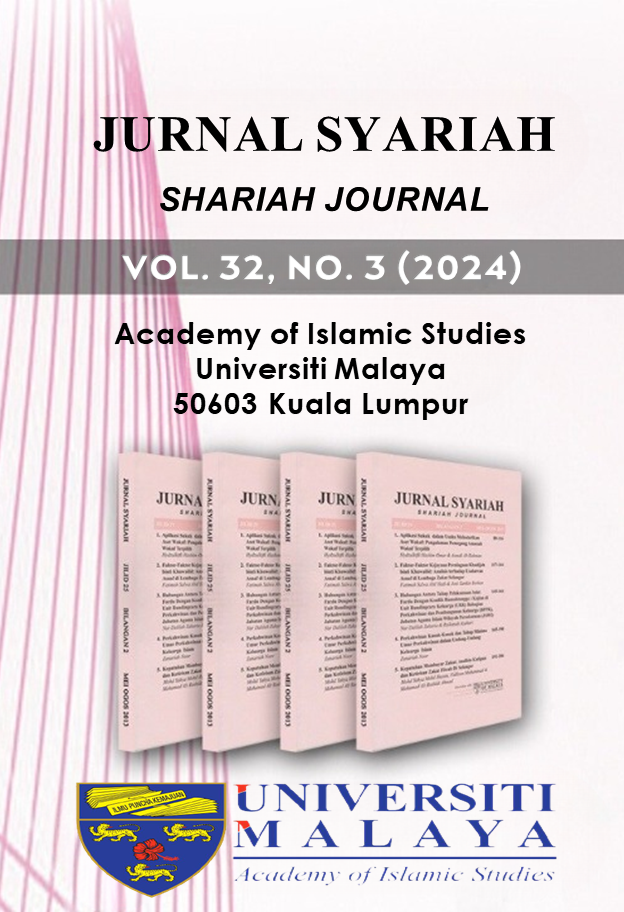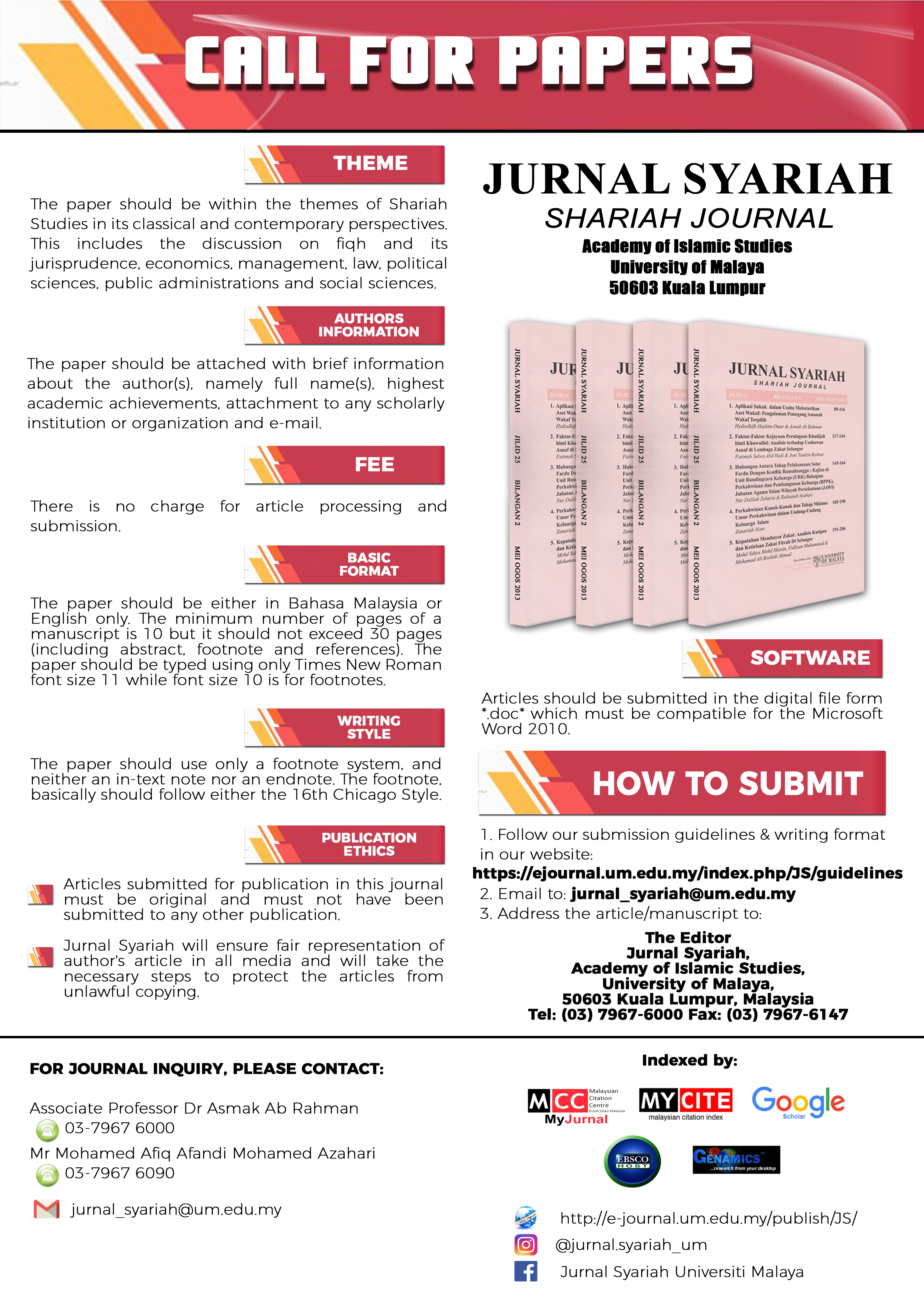CRYPTOCURRENCY IN NIGERIA: A REVIEW FROM CONTEMPORARY ISLAMIC SCHOLARS’ PERSPECTIVE
DOI:
https://doi.org/10.22452/syariah.vol32no3.5Keywords:
cryptocurrency, Sharī‘ah, Nigeria, Islamic scholars, ghararAbstract
This study aims to investigate the Sharī‘ah-compliance status of cryptocurrencies in Nigeria, with a particular focus on the Northern region of Arewa. Adopting a qualitative research methodology, the study utilises library research and document analysis to review contemporary Islamic scholars’ perspectives on cryptocurrencies in the region. The findings revealed that while the use of cryptocurrencies is not generally prohibited for public use, financial institutions are restricted from engaging in cryptocurrency transactions. The debate on whether using cryptocurrencies is ḥalāl (lawful) or ḥarām (prohibited) remains contentious, with some scholars classifying it as ḥarām due to concerns regarding their intrinsic value and lack of governmental recognition as legal tender. Such attributes are perceived to pose risks related to gambling, money laundering, and other prohibited activities. The study recommends prudent regulation and management of cryptocurrency by the Central Bank of Nigeria (CBN) and financial institutions in order to gain acceptance among Muslims in Northern Nigeria.
Downloads
References
Abdeldayem, M. M., A L Dulaimi, S. H., & Nekhili, R.. ‘Cryptocurrency as a Fin-Tech Instrument and Islamic Finance: The GCC Perspective’. Journal of Xi’an University of Architecture & Technology, vol. XII/(II2747), (2020): 2736.
Abdul, A. ‘Cryptocurrencies in Nigeria: a legal analysis,’ (2018), https://papers.ssrn.com/sol3/papers.cfm?abstract_id=3106296, accessed on 28 January 2025
Adesina, O. ‘Nigerians’ love for cryptocurrencies is on the rise, as it offers cheaper ways to transfer funds,’ Nairametrics (2020, May 24). https://nairametrics.com/2020/05/24/nigerians-love-for-cryptocurrencies-on-the-rise-as-it-offers-cheaper-ways-to-transfer-funds/, accessed on 28 January 2025
Adunola, S. ‘Islamic perspective on cryptocurrency, by scholars,’ Guardian Newspapers, (2021, March 19). https://guardian.ng/features/islamic-perspective-on-cryptocurrency-by-scholars/ accessed on 28 January 2025
Agu, C. J., & Kindgom, U. ‘Impact of cryptocurrency on Africa’s economy,’ Working Paper, (2020). https://www.researchgate.net/publication/347089003 accessed on 28 January 2025
Akinwotu, E. ‘Out of control and rising: why bitcoin has Nigeria’s government in a panic,’ The Guardian. (2021, July 31). https://amp.theguardian.com/technology/2021/jul/31/out-of-control-and-rising-why-bitcoin-has-nigerias-government-in-a-panic?__twitter_impression=true accessed on 28 January 2025
Amsyar, I., Christopher, E., Dithi, A., Khan, A. N., & Maulana, S. ‘The Challenge of Cryptocurrency in the Era of the Digital Revolution: A Review of Systematic Literature,’ Aptisi Transactions on Technopreneurship (ATT), vol. 2/2 (2020): 153–159. https://doi.org/10.34306/att.v2i2.96
Balarabe, A., & Abdullah, M. F. ‘Ujrah-Based Islamic Credit Card: A Sharī‘ah-Compliancy Analysis,’ International Journal of Islamic Economics and Finance Research, 5/1 July (2022): 54-68.
Chow, S. S., Choo, K. K. R., & Han, J. ‘Editorial for accountability and privacy issues in blockchain and cryptocurrency,’ Future Generation Computer Systems, vol. 114 (2021): 647-648.
Dodgson, J. E., ‘About research: Qualitative methodologies,’ Journal of Human Lactation, vol. 33/2 (2017): 355-358. https://doi.org/10.1177/0890334417698693
Ekong, U. M., & Ekong, C. N., ‘Digital currency and financial inclusion in Nigeria: lessons for development,’ Journal of Internet and Digital Economics, vol. 2/1 (2022): 46–67. https://doi.org/10.1108/jide-11-2021-0018
Gottimukkala, R., & Jenq, J., ‘The impact and trend of virtual currency,’ In 25th World Multi-Conference on Systemics, Cybernetics and Informatics, WMSCI 2021 (pp. 126-130). International Institute of Informatics and Systemics, IIIS, (2021).
Halliday, C. E., ‘Legal Impact of the Finance Act 2019 on Taxation, Mergers and Other Business Combinations in Nigeria,’ Journal of Commercial and Property Law, vol. 8/4 (2021): 30-40.
Kaaru, S., ‘Nigeria remains global leader in ‘Bitcoin’ Google searches amid government crackdown,’ COINGREEK. (2024). https://coingeek.com/nigeria-remains-global-leader-in-bitcoin-google-searches-amid-government-crackdown/
Kamsky, A., ‘What Happens to Bitcoin After All 21 Million Are Mined?,’ CCN. (2024 October 14) https://www.ccn.com/education/what-happens-to-bitcoin-after-all-21-million-are-mined/#:~:text=By%202140%2C%20all%2021%20million,rely%20solely%20on%20transaction%20fee.
Kfir, I., ‘Cryptocurrencies, national security, crime and terrorism,’ Comparative Strategy, vol. 39/2 (2020): 113-127.
Krishnan, S., Balas, V. E., Golden, J., Robinson, Y. H., Balaji, S., & Kumar, R. (Eds.), Handbook of research on blockchain technology. (Cambridge: Academic Press, 2020).
Kusuma, T., Zainal, V. R., Subagja, I. K., & Basalamah, S., ‘The Perspective of Islamic Law on Cryptocurrency for Commodity Future Exchange in Indonesia,’ Journal Of Islamic Studies and Culture, vol. 8/1 (2020). https://doi.org/10.15640/jisc.v8n1a1
Maxwell, J. A., ‘Why qualitative methods are necessary for generalisation,’ Qualitative Psychology, vol. 8/1 (2021): 111–118. https://doi.org/10.1037/qup0000173
Nwanisobi Osita, ‘Central Bank of Nigeria Press Release Response to Regulatory Directive on Cryptocurrencies,’ (2021). www.cbn.gov.ng
Oghenetega, A., ‘The Prohibition of Cryptocurrency Transactions by the Central Bank of Nigeria,’ (2021). https://ssrn.com/abstract=4023644
Onaleye, T., ‘Nigerian Government Likely to Regulate Cryptocurrency Trading as Citizens Grow Interest and Risk Appetite,’ Tecknect. (2020, July 15). https://technext24.com/2020/07/15/south-africa-cbn-and-the-choice-between-regulating-and-prohibiting-the-nigerian-crypto-market/#google_vignette.
Oziev, G., & Yandiev, M., Cryptocurrency from Shari’ah perspective. (2017). https://ssrn.com/abstract=3101981
Saleh, A. H. A. I., Ibrahim, A. A., Noordin, M. F., & Mohadis, H. M., ‘Islamic approach toward purification of transaction with cryptocurrency,’ Journal of Theoretical and Applied Information Technology, vol. 98/6 (2020): 1050-1067.
Schwab, ‘Cryptocurrencies: What Are They?’ (2024, February 23). https://www.schwab.com/learn/story/cryptocurrencies-what-are-they.
Shen, C.-w., Chang, L.-c. and Su, T.-c., ‘Research development of Bitcoin: a network and concept linking analysis,’ Library Hi Tech, vol. 39/2 (2021): 488-505. https://doi.org/10.1108/LHT-10-2019-0210
Siswantoro, D., Handika, R., & Mita, A. F., ‘The requirements of cryptocurrency for money, an Islamic view,’ Heliyon, vol. 6/1 (2020): 03235.
Spurt! Research Reports. ‘Tracing Cryptocurrency Adoption, Regulation, and Innovation in Africa (2012-2023).’ https://www.linkedin.com/pulse/tracing-cryptocurrency-adoption-regulation-innovation-africa-n29lf/ (January 25, 2024).
Ukwueze, F. O., ‘Cryptocurrency: Towards Regulating the Unruly Enigma of Fintech in Nigeria and South Africa,’ Potchefstroom Electronic Law Journal (PELJ), vol. 24/1 (2021).: 1–38. https://doi.org/10.17159/1727
Downloads
Published
How to Cite
Issue
Section
License
Copyright (c) 2024 Jurnal Syariah

This work is licensed under a Creative Commons Attribution-NonCommercial 4.0 International License.
COPYRIGHT: All rights reserved. Not allowed to be reproduced any part of articles and contents of this journal in any form or by any way, whether electronic, mechanical, photocopying, recording or otherwise without permission in writing from the Chief Editor, Jurnal Syariah.



















